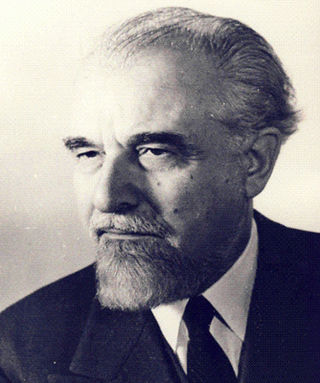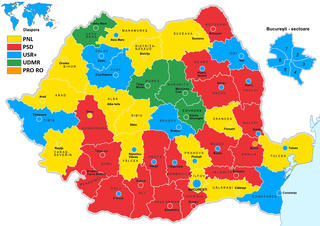
The Social Democratic Party is the largest social democratic political party in Romania and also the largest overall political party in the country, aside from European Parliament level, where it is the second largest by total number of political representatives, after the National Liberal Party (PNL). It was founded by Ion Iliescu, Romania's first democratically elected president at the 1990 Romanian general election. It is currently part of the National Coalition for Romania (CNR), which is a big tent grand coalition comprising also the National Liberal Party (PNL). The CNR formerly included the Democratic Alliance of Hungarians in Romania (UDMR/RMDSZ) until mid June 2023.

The Romanian Front was a moderate fascist party created in Romania in 1935. Led by former Prime Minister Alexandru Vaida-Voevod, it originated as a right-wing splinter group from the mainstream National Peasants' Party (PNȚ). While in power, Vaida had an ambiguous approach to the Iron Guard, and constructed his own radical ideology; the FR had a generally xenophobic program of positive discrimination, being implicitly antisemitic. It was subsumed to the policies of King Carol II, maneuvering between the mainstream National Liberals, the PNȚ's left-wing, and the more radically fascist Guardists. Vaida tried to compete with the former two and appease the latter, assuming fascist trappings such as the black-shirted uniform. Like the Guard, he supported aligning Romania with the Axis powers, though he also hoped to obtain their guarantees for Greater Romania's borders. The FR's lower echelons included Viorel Tilea and other opponents of Vaida's approach, who believed in Romania's attachments to the League of Nations and the Little Entente.
The Romanian Social Democratic Party was a social-democratic political party in Romania. In the early 1920s, the Socialist Party of Romania split over the issue of affiliation with the Third International. The majority, which supported affiliation, evolved into the Communist Party of Romania in 1921, while the members who opposed the new orientation formed various political groupings, eventually reorganizing under a central leadership in 1927. From 1938 to 1944, the party was outlawed but remained active in clandestinity. After 1944, it allied with the Communists and eventually was forced to reunite with them to form the Workers' Party of Romania in 1948. It published the magazines Socialismul, Lumea Nouă, and Libertatea. After the end of the Communist single-party system in 1989, a group of former members created a new party which proclaimed itself the direct descendant of the PSD.

Ștefan Voitec was a Romanian Marxist journalist and politician who held important positions in the state apparatus of Communist Romania. Debuting as a member of the Socialist Party of Romania in his late teens, he formed the Socialist Workers Party of Romania, then the United Socialist Party, while also engaging in human rights activism and advocating prison reform. The mid-1930s brought him into contact with the Romanian Communist Party, with whom he formed tactical alliances; however, he rejected its political line, and was for a while known as a Trotskyist. In 1939, he joined the consolidated Social Democratic Party, which reunited various socialist groups outlawed by the National Renaissance Front. During World War II, despite ostensibly withdrawing form political life to do research, Voitec served as the party's Secretary and joined the anti-fascist underground. Some reports suggest that he was also a committed anti-communist, critical of the Soviet Union to the point on endorsing war in the East. As a war correspondent, Voitec made contributions to Nazi propaganda, an issue which made him vulnerable to blackmail in later decades.
The Socialist Party of Romania was a Romanian socialist political party, created on December 11, 1918 by members of the Social Democratic Party of Romania (PSDR), after the latter emerged from clandestinity. Through its PSDR legacy, the PS maintained a close connection with the local labor movement and was symbolically linked to the first local socialist group, the Romanian Social-Democratic Workers' Party. Its creation coincided with the establishment of Greater Romania in the wake of World War I; after May 1919, it began a process of fusion with the social democratic groups of in the former territories of Austria-Hungary — the Social Democratic Parties of Transylvania, Banat and Bukovina. The parties adopted a common platform in October 1920. Progressively influenced by Leninism, the PS became divided between a maximalist majority supporting Bolshevik guidelines and a reformist-minded minority: the former affiliated with the Comintern as the Socialist-Communist Party in May 1921, while the minority eventually established a new Romanian Social Democratic Party.
The Union of Romanian Jews was a political organisation active in Romania in the first half of the 20th century.

The General Jewish Labour Bund in Romania was a Jewish socialist party in Romania, adhering to the political line of the General Jewish Labour Bund. Founded in 1922, shortly after the establishment of Greater Romania, it united Jewish socialists in Bukovina, Bessarabia and the Romanian Old Kingdom. Standing for the lay wing of the Jewish representative movement, the Romanian Bund had atheistic leanings and offered an alternative to the mainstream Jewish organization. Like other Bundist groups, but unlike the Marxist-inspired Poale Zion bodies of Bessarabia, it rejected Zionism.

Mihail Gheorghiu Bujor was a Romanian lawyer, journalist and socialist militant. An important figure in the early Romanian labour movement, he embraced communism during World War I and organised Romanian armed detachments in Odesa in support of the October Revolution, hoping to foment a revolution in his native country. A political prisoner in Romania for much of the interwar period and during World War II, he held several minor political offices after the regime change in the late 1940s.
Aladar Imre, also known as Pavel Corneliu, was a Romanian trade unionist, communist militant and member-elect of the Romanian Parliament, executed in the Soviet Union during the Great Purge.

Ovidiu Sincai Social Democratic Institute Foundation is a non-governmental organization from Romania.
The Banat Socialist Party was a political party in the Banat, Romania. The party was founded by social democratic branches in Banat on September 19, 1919, as the Banat Social Democratic Party. In December 1919, the party merged with the Social Democratic Party of Transylvania, but retained its autonomy. The name Banat Socialist Party was adopted at a party conference on May 2, 1920. The party was affiliated to the Federation of Socialist Parties in Romania.

Ottoi Călin was a Romanian physician, journalist and socialist militant, considered one of the theoreticians of the Romanian workers' movement during the early 20th century.

Max Wexler was a Romanian socialist activist and journalist, regarded as one of the main Marxist theorist of the early Romanian workers' movement.
The Social Democratic Party of Romania was a Marxist social-democratic political party in Romania. A member of the Second International, the party was active between 1910 and 1916, when it was banned. Clandestine groups continued underground activity until 1918, when the end of World War I allowed the party to re-emerge as a legal political group, rechristened Socialist Party of Romania.
The Socialist Workers Party of Romania, later renamed the Independent Socialist Party of Romania, was a political party in Romania. The party was founded in Bucharest on 15 July 1928, as a leftist splinter group of the Social Democratic Party, formed by a minority that opposed the cooperation with the National Peasants' Party.
Proletarul ('Proletarian') was a newspaper published in Romania between July 29, 1928 to May 1, 1935. It was the central organ of the Socialist Workers Party of Romania, later merged into the United Socialist Party. Ștefan Voitec was the editor of the newspaper.

European Parliament elections were held in Romania on 26 May 2019.

Petre Constantinescu-Iași was a Romanian historian, academic and communist politician.










